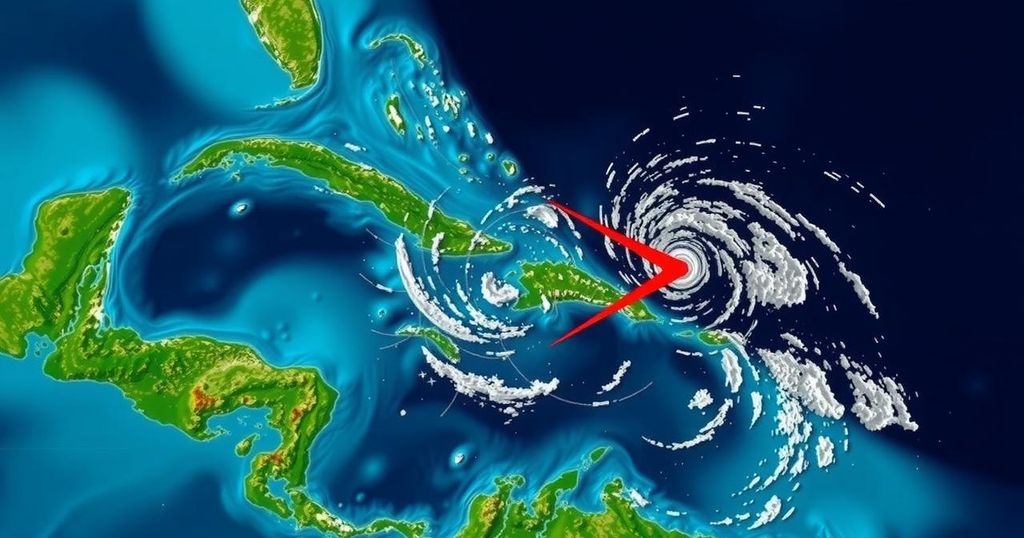Tropical Storm Oscar Advances Toward Bahamas Following Impact on Cuba
Tropical Storm Oscar has progressed toward the Bahamas after hitting Cuba as a Category 1 hurricane, resulting in six fatalities and heavy rainfall. Oscar is noted as the smallest recorded hurricane, surprising forecasters with its unexpected intensity. The storm is part of a predicted above-average Atlantic hurricane season, which raises significant concerns regarding natural disasters and their impacts on vulnerable communities.
Tropical Storm Oscar is currently advancing toward the Bahamas following its recent landfall in Cuba as a Category 1 hurricane. The storm, which has tragically resulted in the deaths of at least six individuals, has also caused significant rainfall on the island that is grappling with a separate, widespread power outage. On Tuesday morning, Oscar was situated approximately 45 miles south-southeast of Long Island in the Bahamas, sustaining winds of 40 mph and moving north-northeast at 12 mph, according to the National Hurricane Center in Miami. While the storm is classified as a tropical storm, it has been noted that “Oscar is at best barely a tropical storm at this time.” Forecasters predict that Oscar will bring heavy rain to the southeastern Bahamas, with potential accumulations of up to five inches and isolated areas receiving even more. A tropical storm warning is currently in effect for the central and southeastern regions of the Bahamas. Remarkably, Oscar has made history by becoming the smallest hurricane ever recorded, with a wind field measuring only about six miles across, catching many forecasters off guard during its landfall on Grand Inagua Island and later, eastern Cuba. Michael Lowry, a noted hurricane specialist and storm surge expert, remarked, “It’s not often we see a colossal failure in hurricane forecasting,” pointing out that no predictive models suggested that Oscar would strengthen to hurricane status. In Cuba, the storm resulted in over 15 inches of rain in some areas, raising concerns of severe flooding and possible landslides. The fatalities reported have been concentrated in Guantánamo. This unprecedented storm impact comes as Cuba is recovering from a significant blackout that has previously sparked protests and strong governmental warnings against unrest. Oscar is categorized as the 15th named storm and the 10th hurricane of the current Atlantic hurricane season, which commenced on June 1 and concludes on November 30. The National Oceanic and Atmospheric Administration has made predictions for an above-average hurricane season in 2023, citing record-warm ocean temperatures and estimating that there will be between 17 and 25 named storms, including four to seven major hurricanes of Category 3 or above. Additionally, over in the Pacific Ocean, Tropical Storm Kristy continues to churn, approximately 375 miles west-southwest of Acapulco, Mexico, with maximum sustained winds of 50 mph.
Tropical Storm Oscar represents a significant weather event in the Atlantic hurricane season and highlights issues related to hurricane forecasting. The storm’s unexpectedly small size and range of impact serve as a reminder of the complexities involved in predicting hurricane behavior, particularly within changing climatic conditions. The effects of Oscar on Cuba, which is recovering from a massive blackout, illustrate the potential for natural disasters to exacerbate pre-existing vulnerabilities in communities. Moreover, the broader context of the Atlantic hurricane season, which is predicted to be above average, raises concerns about the potential frequency and severity of storms based on current ocean temperatures.
In summary, Tropical Storm Oscar has emerged as a formidable weather event, initially making landfall as a Category 1 hurricane in Cuba before advancing toward the Bahamas. The storm has led to tragic loss of life and significant rainfall, posing risks of floods and landslides. The situation is underscored by broader concerns of climate change and infrastructure resilience, particularly for nations like Cuba. As the hurricane season progresses, the predictions from meteorological agencies point to an increased likelihood of severe storms ahead, marking a critical period for preparedness and response efforts.
Original Source: www.seattletimes.com




Post Comment